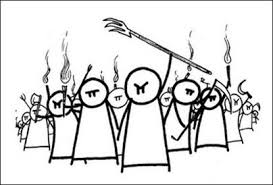Go Lean Commentary
 Enquiring minds want to know:
Enquiring minds want to know:
How do “we” fix Inequality?
After a long period of study – observing-and-reporting on the American societal defects – we find that we have to use Offense and Defense.
Yes, this is strenuous heavy-lifting …
… if “Inequality” was a candle that we needed to consume, then we would have to burn it at both ends. Our discussion on “Inequality” obviously refers to Income Inequality, yes but also other inequalities like:
- Racial
- Gender
- Trade
- Geographic Locations – Urban / Rural – and others
While observing-and-reporting on the America eco-system, we notice that racism was not the only societal defect that the Caribbean needs to be concerned about. That country is equally infested with Crony-Capitalism, an exploitation of the Public Trust for private gain; (there are so many examples, i.e. Big Pharma, Big Oil, Big Defense, Big Tobacco, Big Banks, etc.). This problem in America results in more Income Inequality; more “Us vs Them”; “Us” as in a rich minority (Oligarchy) versus “Them”, as in the Middle Class (or poor) masses. This is another reflection of a defective Community Ethos – the underlying sentiment that informs the beliefs, customs, or practices of society.
 Crony-Capitalism is manifested when the rich in society is permitted (cuddled and protected) to get more-and-more while pushing back against the Middle Class, forcing them to end up with less-and-less.
Crony-Capitalism is manifested when the rich in society is permitted (cuddled and protected) to get more-and-more while pushing back against the Middle Class, forcing them to end up with less-and-less.
This is the continuation (and conclusion) of the February 2021 Teaching Series on Zero Sum Thinking; this is a fallacy that for one person to gain wealth, another person must lose. We find the opposite is the truth, that our New World Order is one of Non-Zero Sum, where Win-Win is actually possible; no need to re-distribute the pie’s slices, but rather grow a bigger pie for all to share … and/or introduce new pies that were not possible before.
This is all about the bad Community Ethos that persists in America … and here in Caribbean. We have a problem with Income Inequality too. To remediate and mitigate this problem, we must start with reforming and transforming our Community Ethos and then execute new strategies, tactics and implementation in our economic, security or governing engines.
This February 2021 Teaching Series, from the movement behind the 2013 book Go Lean…Caribbean, is lamenting how the structures have crumbled that support the Middle Class; rather, the rich (Oligarchy) is getting richer while the poor is getting poorer.
This is not just an American problem. Think of Caribbean tourism:
There used to be a time, when tourists arriving by airplane at the airport would need to contract with an independent Service Provider – Taxi Driver – to get from Point A to Point B. But now, most of those tourists are arriving via cruise ships, right into the Downtown Ports, so there is no need for individual transportation. The economic activity therefore has shrunk, replaced with corporate-own Tour Bus Drivers, who is only earning the minimum wage or close to it.
This is not Win-Win. Instead, imagine the same economic activity but …
… with a Cooperative of Independently-owned, but collective-bargained Tour Bus Operators.
This is how Non-Zero Sum cooperation, collaboration, collusion, collective-bargaining and community-building is manifested. This is the advocacy of this Teaching Series. This is the final entry, 6-of-6. See here, how this consideration supplements the full catalog of discussions this month:
- Zero Sum: Lesson 101 – No more “Gold Standard”
- Zero Sum: Realities of Globalism – “Non-Zero Sum” for the whole world
- Zero Sum: ICT as a tool, the “Great Equalizer”
- Zero Sum: Regional Tourism should not be a competition – Encore
- Zero Sum: Book Review – Racism is a factor; “Us vs Them”
- Zero Sum: How to fix “Inequality” – Raise the tide, all boats are elevated
We started this series on Zero Sum by looking at economic principles – the “Gold Standard” – now we conclude with a return to the economic perspective. We want to fix Income Inequality by “raising the tide for all boats in the harbor’; this way everyone gets to enjoy economic growth, a bigger pie, or even a 2nd pie, as in the Caribbean Union Trade Federation (CU).
How do we accomplish Non-Zero Sum for societal wealth, and ensure an equitable distribution – a strong Middle Class?
Before answering, we must acknowledge that there is a difference between wealth and power. See the Robert Reich commentary in the Appendix VIDEO below, where he posits that:
Power is a Zero Sum game; for one person to get it, they have to take it from others.
To prevent all the wealth (and power) from consolidating in the hands of just a small minority – Oligarchy – there is the need to employ Offense and Defense strategies. These strategies allow us to proactively engage Best Practices to grow the economy while strenuously protecting the economic engines from abuse. We get to guard against the “Barbarians at the Gate“.
Yes, this subject is a grave issue for stakeholders in society to consider. This should be the quest for all societal stewards: to actively grow the Caribbean economy, while being “On Guard” for the negative influences that undermines universal opportunity or causes Income Inequality.
There is an Art & Science to fostering a healthy Middle Class. There is no need to research this topic anew. We have already addressed this in the pages of this Go Lean commentary. It is only apropos to Encore and Excerpt samples and examples of these previous postings – see 4 Offenses and 4 Defenses here:
>>> Offense #1 <<<
Two Pies: Economic Plan for a new Caribbean – February 23, 2017 – 
There are a lot of money issues to contend with – but no one person’s hands are in another person’s pockets. So all the money issues for CU are exclusive to the CU. This is true of money-economics and other facets of Caribbean life: security and governance. …
In order to reboot the societal engines there must be these Two Pies. The CU Trade Federation is designed to lead, fund and facilitate regional empowerment plans. But the plan is NOT for the individual member-states to write checks to the CU so as to share one state’s treasuries with another state. Rather, the CU Trade Federation creates its own funding – from regionalized services – and then encumbers the funds for each member-state to deliver the economic, security and governing mandates. This is analogized as Two Pies:
- One ‘pie‘ to represent the existing budgets of the member-states and how they distribute their government funding between government services (education, healthcare, etc.), security measures (Police, Coast Guards)
- One ‘pie‘ to represent the CU funding from exclusive activities (Spectrum Auctions, Lottery, Exploration Rights, Licenses, Foreign-Aid, etc.).
>> Defense #1 <<<
‘Mitigating Income Inequality’ – a Book Review’ – Sep 17, 2015 
Income Inequality = the rich becoming richer while the middle classes shrink. …
The desire to eliminate or reduce Income Inequality is a practical argument for social cohesion and to reduce social unrest; as such eruptions can weaken society. Income Inequality has a slippery slope that can lead to down to Failed-State status. Now after waging global conflicts of World War I, World War II plus countless regional conflicts and sectarian violence, it is important for societies to be “on guard” for encroachments in this regard. …
[Some politicians] opined … that an “upper-crust of extremely wealthy families are hell-bent on destroying the democratic vision of a strong middle-class which has made the United States the envy of the world. In its place they are determined to create an oligarchy in which a small number of families control the economic and political life of our country. …
Economic researchers John Schmitt and Ben Zipperer (2006) of the CEPR (Center for Economic and Policy Research) point to economic liberalism and the reduction of business regulation along with the decline of union membership as one of the causes of economic inequality. In an analysis of the effects of intensive Anglo-American liberal policies in comparison to continental European liberalism, where unions have remained strong, they concluded “The U.S. economic and social model is associated with substantial levels of social exclusion, including high levels of Income Inequality, high relative and absolute poverty rates, poor and unequal educational outcomes, poor health outcomes, and high rates of crime and incarceration. At the same time, the available evidence provides little support for the view that U.S.-style labor-market flexibility dramatically improves labor-market outcomes. Despite popular prejudices to the contrary, the U.S. economy consistently affords a lower level of economic mobility than all the continental European countries for which data is available.”[68] …
Ha-Joon Chang, Reader in the Political Economy of Development at Cambridge University, has written a fascinating book on capitalism’s failings. … Chang takes on the free-marketers’ dogmas and proposes ideas like – there is no such thing as a free market; the washing machine has changed the world more than the internet has; we do not live in a post-industrial age; globalisation isn’t making the world richer; governments can pick winners; some rules are good for business; US (and British) CEOs are overpaid; more education does not make a country richer; and equality of opportunity, on its own, is unfair.
>> Offense #2 <<<
Mineral Extraction 101 – Commerce of the [Caribbean] Seas – January 25, 2021 – 
Opportunity is awaiting the Caribbean … for mineral extraction and oil exploration. …
Beaches are gravely important for the American East Coast. (They are important to Caribbean communities as well). So many communities depend on beach vacation and traffic during the spring/summer months (think Spring Break and the commercial summer season of Memorial Day to Labor Day). So when oil spills or predictable storms endanger beach sand, it becomes an urgent imperative for communities to assuage the crisis, even replace the sand …
Everyone has a price! So if the price goes up high enough, there may be interested parties among Caribbean member-states to take the money for allowing mineral/oil extraction in their offshore vicinity. There is a need to be alarmed at such proposals, as dredging sand or drilling for oil may endanger protected reefs or other underwater marine features.
With greater demand – imagine post hurricanes – the Laws of Supply-and-Demand will mandate that the prices for extracted minerals will only increase.
It will get more and more tempting!
The movement behind the book Go Lean…Caribbean wants to add other types of economic activities to the Caribbean landscape; we urgently want to use the sea as an industrial zone. This is because the Caribbean region is badly in need of jobs. The book urges communities to empower the economic engines of the Caribbean Sea, as in mineral & oil extraction.
The region’s economic driver is tourism. Tourism and “mineral extraction or oil exploration” are incompatible activities. Thus there is the need for the cautions in this commentary. The challenge is to embrace the commerce of mineral extraction for the positives, while avoiding the negatives.
Challenge accepted!
>>> Defense #2 <<<
Unequal Justice: Envy and the Seven Deadly Sins – September 29, 2019 – 
All the talk of economic inequality – the rich getting richer; the poor getting poorer; the middle-class shrinking – is really a discussion on justice & injustice.
After thousands of years of human history, we have come to an indisputable conclusion:
Inequality is never tolerated for long. Eventually the “Have-Nots” demand what the “Have’s” have!…
The Cardinal Sin of Envy forces the hand of the stakeholders in society to conform with programs that abate and mitigate Income Inequality.
The movement behind the book Go Lean…Caribbean have addressed Income Inequality on many occasions; the book introduced the roadmap for the implementation of the Caribbean Union Trade Federation (CU). This CU strives to reboot the economic engines in the region so as to create more opportunities (job-and-entrepreneurial) for everybody in the Caribbean region – men, woman, Black-Brown-and-White in all 30 member-states. This quest is designed to grow the Middle Class.
>>> Offense #3 <<<
BHAG – Infrastructure Spending … finally funding Toll Roads – March 16, 2020 – 
Is it so “pie in the sky” to think that our Caribbean communities can organize, plan and execute infrastructure projects so that people can safely travel by road, mitigating traffic congestion, and get to their destinations to live, work and play?
“Pie in the sky” or just “sky” is the key reference here. This commentary asserts that some of the congested streets in the Caribbean member-states can find relief by building “skyways” and overpasses; and they can be Toll Roads.
This vision was always part of the roadmap, as described in the 2013 book Go Lean…Caribbean. This roadmap introduces the technocratic Caribbean Union Trade Federation (CU) as a super-national entity with Port Authority functionalities, to build highways, bridges, tunnels, docks and other Public Works (infrastructure) to facilitate the societal engines (economics, security and governance) of the Caribbean region. The book describes that transportation solutions must be embedded into any plan to elevate Caribbean society. …
The subject of Infrastructure is a Big Deal for the consideration of reforming or transforming the Caribbean region. The premise of the Go Lean roadmap is that the leverage of the 30 member-states and 42 million people will allow for Public Works initiatives that are bigger and better than any single (one) member-state alone. “Toll Roads” is one such example, though only a subset of the planned Union Atlantic Turnpike. The plan is for the Turnpike Authority to design and facilitate one North-South and one East-West highway as applicable in each island or coastal-state.
Yes, the highways will be Toll Roads; that charges fees for each ride. The “small pennies add up to millions” over time. This funding mechanism of the Turnpike Authority allows present infrastructure investments based on those future revenues; think bonds and loans.
>>> Defense #3 <<<
Taking from the Poor to Give to the Rich – December 20, 2017 – 
The US Congress and White House have done it, they have successfully passed their Tax Reform bill that effectively “takes from the poor and gives to the rich”…
The Tax Reform strategy here double-downs on the concept of Supply-side economics. The hope is that corporate entities and wealthy people will receive tax breaks and then use the “wind fall” to re-invest in the community, thereafter creating jobs and economic growth. The Republicans in Washington (Congress and the White House) are betting on the success of this strategy even though there has been utter failures with this approach; for example just recently in the US State of Kansas.
Whether that re-investment occurs or not is the unknown. What is known is that the Rich will undoubtedly get the tax breaks. The Rich will win, at the expense of the Poor.
>>> Offense #4 <<<
Welcoming the Dreaded ‘Plutocracy’ – September 14, 2014 – 
It is not nice to be called a plutocracy, it’s almost considered a derogatory term. It simply refers to the undue influence that a super-rich minority group can have on a nation.
The dread of plutocracies is not new, societies have contended with them since the dawn of civilization (Ancient Greece and Rome). Many countries in the Caribbean had de facto plutocracies during their colonial years (Montserrat, Belize and the Bahamas’s Bay Street Boys come to mind), just as a natural off-shoot from a mono-industrial economy (sugar, coffee, tobacco planters). Considering existing plutocracies today, like the City of London and Wall Street, we see that an appropriate strategy can allow a society to “bottle the plutocratic concept” and use it for good. …
The idea of “bottling” plutocratic institutions for the Greater Good is a “big idea” in the book Go Lean…Caribbean. How exactly is this envisioned? The answer provided in the book is that of Self-Governing Entities (SGE).
The Go Lean book delves into this approach of inviting the super-rich to establish industrial parks, corporate campuses and research parks in bordered territories in the Caribbean. These entities would be governed solely by the technocratic Caribbean Union Trade Federation (CU). The Go Lean book serves as a roadmap for the introduction and implementation of the CU and SGE’s.
The approach of the Go Lean roadmap is not to punish the super-rich for their success nor cower to any special interests group at the expense of the greater population.
>>> Defense #4 <<<
Forging Change – Opposition Research: Special Interest – January 30, 2020 – 
The best offense is a good defense.
This is a winning strategy in football, yes (think NFL), but in nation-building as well. The actuality of the 30 Caribbean member-states is that we are losing … to the competition and opposition:
- We cannot attract and retain our young people to Stay Home in the region.
- We cannot muster the political will to reform or transform our societal engines (economics, security and governance).
Who exactly are our competition or opposition? What do we know of their motives or designs? How can we overcome their hindrance?
These are important questions to consider – and answer – if we want to succeed in reforming and transforming the societal engines in our region. This activity is referred to as Opposition Research, where we study and gather intelligence on any adversarial opponent that may challenge us from reaching our goals. …
There is a name for our pain; there are named opponents that hinders us; one of them is the United States of America. This is NOT a Declaration of War; rather this is just an acknowledgement that many of the policies and practices of America works counter-productive to Caribbean hopes and dreams. We are frenemies. …
Who is the opposition? Needless to say, we are not talking about the common people on the street, rather we are referring to Crony-Capitalistic stakeholders in the country: Special Interest, Big Business, Corrupt Politicians. This is the Opposition.
How can we overcome the hindrance of the Opposition?
Answer: We overcome their hindrance by Forging Change in our society; we reform and transform the economic, security and governing engines despite the local opposition. We get the public to want the manifestation of this vision. We get the political leaders to lean-in this roadmap. This way we have Bottoms-Up and Top-Down pressure to make this roadmap succeed. Lastly, this dissuades our citizens from leaving the homeland as well; thereby sparing them from the American “nightmare” as the only available Dream – Caribbean people have dreams too!
The book Go Lean … Caribbean posits that America’s history (and present) has been plagued with Crony-Capitalism (and the other defect of Institutional Racism). This should not the role model the Caribbean would want to emulate, where the rich gets richer and the poor gets poorer. Rather, the book advocates for a Non-Zero Sum climate, to where we would NOT punish rich people, but still empower the Middle Class for more success.
In their homeland, the American Dream is now in jeopardy. How about in the Caribbean; is there a Caribbean Dream?
Yes, indeed. It is the quest to make the Caribbean a better place to live, work and play.
The Go Lean book stressed that there must be opportunities to fulfill the Caribbean Dream. To get an education, and a job, and a home, and good healthcare options and the preservation of our culture. This can be summarized as “prosper where planted” for our citizens … and our children and grandchildren too.
Yes, we can …
In addition to the above references, this commentary has submitted other posts related to Income Inequality, monitoring it, mitigating it and managing it. Consider this sample of other blog/commentaries:
| https://goleancaribbean.com/blog/?p=19813 | Good Leadership: Caring builds trust; trust builds caring |
| https://goleancaribbean.com/blog/?p=19572 | MasterClass: Economics and Society |
| https://goleancaribbean.com/blog/?p=18371 | Student Loans Could Dictate Justice |
| https://goleancaribbean.com/blog/?p=11598 | Plea to Philanthropic Rich: Give us your Time, Talent and Treasuries |
| https://goleancaribbean.com/blog/?p=10043 | Integration Plan for Greater Caribbean Prosperity |
| https://goleancaribbean.com/blog/?p=8669 | Lesson from Detroit’s Action Plan: Make Community College Tuition-free |
| https://goleancaribbean.com/blog/?p=8370 | A Lesson in Economic Fallacies – Austerity: Dangerous Idea? |
| https://goleancaribbean.com/blog/?p=7789 | An Ode to Detroit – Lessons on Trade |
| https://goleancaribbean.com/blog/?p=5559 | Economic Principle: Profit – When ‘Greed is Good’ |
| https://goleancaribbean.com/blog/?p=5597 | Economic Principle: Wages – Market Forces -vs- Collective Bargaining |
| https://goleancaribbean.com/blog/?p=5542 | Economic Principle: Rent – Bad Ethos of Rent-Seeking |
Zero Sum versus Non-Zero Sum …
… this is an important consideration. Let’s go Non-Zero Sum. We need our people and institutions in the Caribbean region to cooperate, not compete; working together. There is opportunity for all of us, every citizen and resident in the 30 member-states of the region – “our pie will just grow, not splice”. This urging even corresponds with the Bible’s exhortation against competition – considering the actuality of the professed Christianity in the region:
“Let us not become egotistical, stirring up competition with one another, envying one another.”— Galatians 5:26 NWT .
All persons in the Caribbean are hereby urged to lean-in for this Go Lean roadmap to cooperate, confederate, collaborate, collude, collective-bargain and community-build.
Now’s the time for these empowerments in our Caribbean homeland. Let’s build a better society. We now know how, by employing the strategies, tactics and implementations presented in the book Go Lean…Caribbean. These are conceivable, believable and achievable.
Yes, we can … 🙂
About the Book
The book Go Lean…Caribbean serves as a roadmap for the introduction and implementation of the technocratic Caribbean Union Trade Federation (CU), for the elevation of Caribbean society – for all member-states. This CU/Go Lean roadmap has these 3 prime directives:
- Optimization of the economic engines in order to grow the regional economy to $800 Billion & create 2.2 million new jobs.
- Establishment of a security apparatus to ensure public safety and protect the resultant economic engines.
- Improve Caribbean governance to support these engines, including a separation-of-powers between the member-states and CU federal agencies.
The Go Lean book provides 370-pages of turn-by-turn instructions on “how” to adopt new community ethos, plus the strategies, tactics, implementations and advocacies to execute so as to reboot, reform and transform the societal engines of Caribbean society.
Download the free e-Book of Go Lean … Caribbean – now!
Who We Are
The movement behind the Go Lean book – a non-partisan, apolitical, religiously-neutral Community Development Foundation chartered for the purpose of empowering and re-booting economic engines – stresses that reforming and transforming the Caribbean societal engines must be a regional pursuit. This was an early motivation for the roadmap, as pronounced in the opening Declaration of Interdependence (Pages 12 – 13):
xi. Whereas all men are entitled to the benefits of good governance in a free society, “new guards” must be enacted to dissuade the emergence of incompetence, corruption, nepotism and cronyism at the peril of the people’s best interest. The Federation must guarantee the executions of a social contract between government and the governed.
xvi. Whereas security of our homeland is inextricably linked to prosperity of the homeland, the economic and security interest of the region needs to be aligned under the same governance. Since economic crimes … can imperil the functioning of the wheels of commerce for all the citizenry, the accedence of this Federation must equip the security apparatus with the tools and techniques for predictive and proactive interdictions.
xxiv. Whereas a free market economy can be induced and spurred for continuous progress, the Federation must install the controls to better manage aspects of the economy: jobs, inflation, savings rate, investments and other economic principles. Thereby attracting direct foreign investment because of the stability and vibrancy of our economy.
Sign the petition to lean-in for this roadmap for the Caribbean Union Trade Federation.
Appendix VIDEO – The System: Who Rigged It, How We Fix It | Robert Reich – https://youtu.be/Y_sjfchNsiM
Robert Reich
Published March 24, 2020 – Former Secretary of Labor Robert Reich presents the reader’s digest of his latest book, The System: Who Rigged It, How We Fix It. He explores the system of power in America that bails out corporations instead of people, even in times of crisis, and breaks down how we have socialism for corporations and the rich, and harsh capitalism for everybody else.
As power has concentrated in the hands of corporations and the wealthy few, those few have grabbed nearly all the economic gains — and political power — for themselves.
Meanwhile, workers have been shafted.
This isn’t a democracy, where all power is shared. It’s an oligarchy, where those at the top have the power to grab everything for themselves.
But history shows that oligarchies cannot hold on to power forever. They are inherently unstable. When a vast majority of people come to view an oligarchy as illegitimate and an obstacle to their wellbeing — which is happening before our very eyes as this crisis exacerbates — oligarchies become vulnerable.
Order Reich’s new book today: https://bit.ly/thesystemrbreich